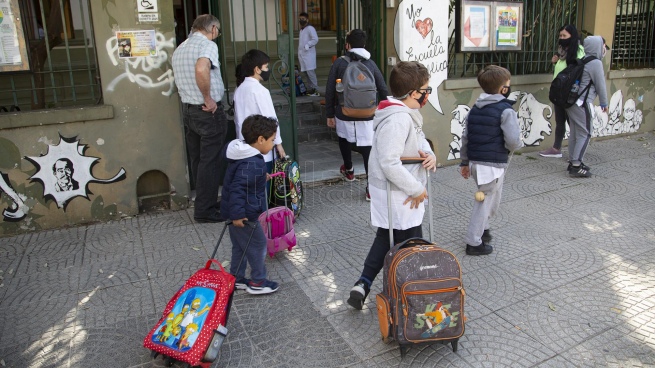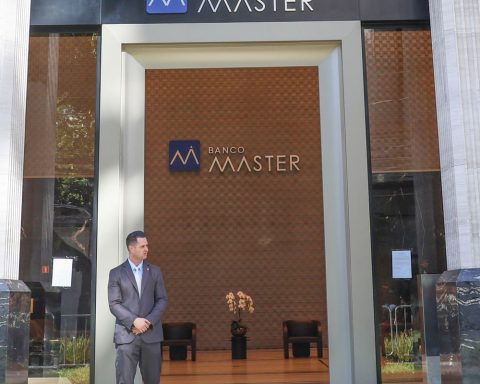Starting this Monday, students at all levels of schools in the City of Buenos Aires (CABA) are released from the obligation to wear the face mask inside the classroom, although many children and parents decided to continue using the mask as a protection measure against the coronavirus.
This noon, the primary students of School No. 3 Juana Manso, in the Buenos Aires neighborhood of Belgrano, left the institution mostly with the chinstrap on.
Consulted by Télam, Lucas (8), a student at this school, assured that “for now” he will continue to wear the mask despite the fact that it is no longer mandatory.
Accompanied by his father, the boy admitted, however, that “at times it is uncomfortable” the mask, but that “it doesn’t bother that much, it’s fine.”
Usually, both parents and teachers who graduated from educational institutions, also remained with their chinstraps on, while the only ones who did not wear it were the children of the initial level.
Meanwhile, once withdrawn from school, the use of the chinstrap is disparate in children who walk with their parents through the streets surrounding schools.
For her part, Guillermina (15), a third-year student at Liceo No. 9 Santiago Derqui, assured that her school “has not notified anything yet,” although she trusted that they will do so as soon as the afternoon shift begins, to which she attends.
Before entering classes, the young woman expressed that despite no longer being mandatory, she will continue to use her mask inside the school.
“If it’s optional, I’m going to continue using it because I live far from school and travel by subway, where there are many people, so to take care of myself and take care of my classmates, I’m going to continue using it,” he said in dialogue with Télam.
He also added that, prior to this measure, most of the teachers asked them to put on their chinstraps properly “when they see that we have them on badly” and that, in general, its use is “pretty well respected”.
Unlike the younger ones, it is mostly seen that adolescents remove their chinstrap shortly after leaving school, although they put it back to enter businesses or public transport.
Last Friday, the head of the Buenos Aires Government, Horacio Rodríguez Larreta explained that the decision was adopted due to “a much more favorable health situation” in which “the contagion rate is less than 1, the level of occupancy of intensive care beds is the lowest in the entire pandemic” and also highlighted the “progress of the vaccination plan.”
Larreta explained that the decision does not cover the teaching staff and assured that it seeks to “improve the socio-emotional well-being of the children by recovering the dynamics in the classrooms and the links with their teachers and their classmates.”
That day, the Minister of Education, Jaime Perczyk, had announced earlier from Ushuaia -where in that city of Fuegian the measure is also optional as of today- that The mandatory use of the chinstrap will be subject to the decision of each province.
Until Friday, the use of the chinstrap was not mandatory for boys from the initial level and up to third grade of elementary school and, instead, all students from fourth grade onwards had to wear it inside the classroom, while for outdoor activities free was already optional for all levels.
Anyway, The ministers of Health from all over the country reinforced on Friday the need to continue using the chinstrap indoors and keep the environments ventilated.
At the meeting of the Federal Health Council (Cofesa) held last Friday, it was recommended “to continue with the mandatory use of the chinstrap, including in school settings, given the time of year and the possible concomitant circulation of different respiratory viruses.”
In the same sense, it was requested “to ensure adequate ventilation of environments”, to maintain “frequent hand washing”, and to avoid going to work, educational activities or public places “in the presence of symptoms”.
In addition, they agreed to suspend the obligation to comply with the 2-meter distance.

















